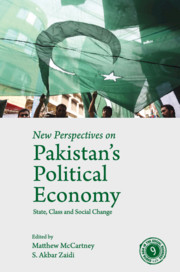Book contents
- Frontmatter
- Contents
- Preface
- Introduction
- 1 In a Desperate State: The Social Sciences and the Overdeveloped State in Pakistan, 1950 to 1983
- 2 The Overdeveloped Alavian Legacy
- 3 Institutions Matter: The State, the Military and Social Class
- 4 Class Is Dead but Faith Never Dies: Women, Islam and Pakistan
- 5 The Amnesia of Genesis
- 6 The Political Economy of Uneven State-Spatiality in Pakistan: The Interplay of Space, Class and Institutions
- 7 An Evolving Class Structure? Pakistan's Ruling Classes and the Implications for Pakistan's Political Economy
- 8 The Segmented ‘Rural Elite’: Agrarian Transformation and Rural Politics in Pakistani Punjab
- 9 Ascending the Power Structure: Bazaar Traders in Urban Punjab
- 10 Democracy and Patronage in Pakistan
- 11 From Overdeveloped State to Praetorian Pakistan: Tracing the Media's Transformations
- About the Contributors
- Index
Introduction
Published online by Cambridge University Press: 26 April 2019
- Frontmatter
- Contents
- Preface
- Introduction
- 1 In a Desperate State: The Social Sciences and the Overdeveloped State in Pakistan, 1950 to 1983
- 2 The Overdeveloped Alavian Legacy
- 3 Institutions Matter: The State, the Military and Social Class
- 4 Class Is Dead but Faith Never Dies: Women, Islam and Pakistan
- 5 The Amnesia of Genesis
- 6 The Political Economy of Uneven State-Spatiality in Pakistan: The Interplay of Space, Class and Institutions
- 7 An Evolving Class Structure? Pakistan's Ruling Classes and the Implications for Pakistan's Political Economy
- 8 The Segmented ‘Rural Elite’: Agrarian Transformation and Rural Politics in Pakistani Punjab
- 9 Ascending the Power Structure: Bazaar Traders in Urban Punjab
- 10 Democracy and Patronage in Pakistan
- 11 From Overdeveloped State to Praetorian Pakistan: Tracing the Media's Transformations
- About the Contributors
- Index
Summary
This is not a book about Hamza Alavi (1921–2003), the Pakistani Marxist sociologist/anthropologist, but about social science in Pakistan, with a particular focus on its political economy, broadly interpreted. Specifically, this book is trying to understand why, how and with what consequences did one particular theoretical perspective come to exercise such a dominating influence on the analysis of state and society in post-independence Pakistan. There was much brilliant and insightful work done in the 1970s and 1980s on agrarian transition (S. Ahmad 1977; Khan 1975; Khan 1981; Hussain 1980), on industrial concentration (Amjad 1983), ethnicity (Ahmed 1998), and democratisation (A. Ahmad 1985, 2000). Yet it was Alavi's overdeveloped state thesis that dominated discussions and continued to determine how the Pakistani state was envisaged.
One possible explanation why Hamza Alavi's thesis has persisted and dominated, especially in the context of Pakistani scholarship, is the sheer breadth of Alavi's intellectual and practical engagement. Many of the studies and academics mentioned above are essential references confined to relatively narrower terms of engagement and disciplines, but wherever one approaches Pakistan through the broad political economy perspective, one finds that Alavi's pioneering work to be of noted relevance.
Before casting the spotlight on this one intervention, a quick digression on the extraordinary range of Alavi's career and scholarship would be worth our while. After all, he ‘was one of the most important intellectuals from the Asian subcontinent to participate in (and in many cases formulate the terms of) debates from the 1960s onwards about Third World development’ (TB 2004:341). This digression may help us understand some aspects of his overdeveloped state thesis.
Alavi started his career in the Bank of India as a Research Officer in 1945 and by 1952 he was one of its five principal officers. Unlike most (if not quite all) Marxist intellectuals, Alavi left a comfortable career and moved to Tanzania to take up farming. He later enrolled for a PhD at the London School of Economics and then pursued a more conventional academic career at the Universities of Sussex, Leeds and Manchester. He was editor of Pakistan Today and was on the editorial boards of the Journal of Contemporary Asia and the Journal of Peasant Studies.
- Type
- Chapter
- Information
- New Perspectives on Pakistan's Political EconomyState, Class and Social Change, pp. 1 - 24Publisher: Cambridge University PressPrint publication year: 2019
- 1
- Cited by



